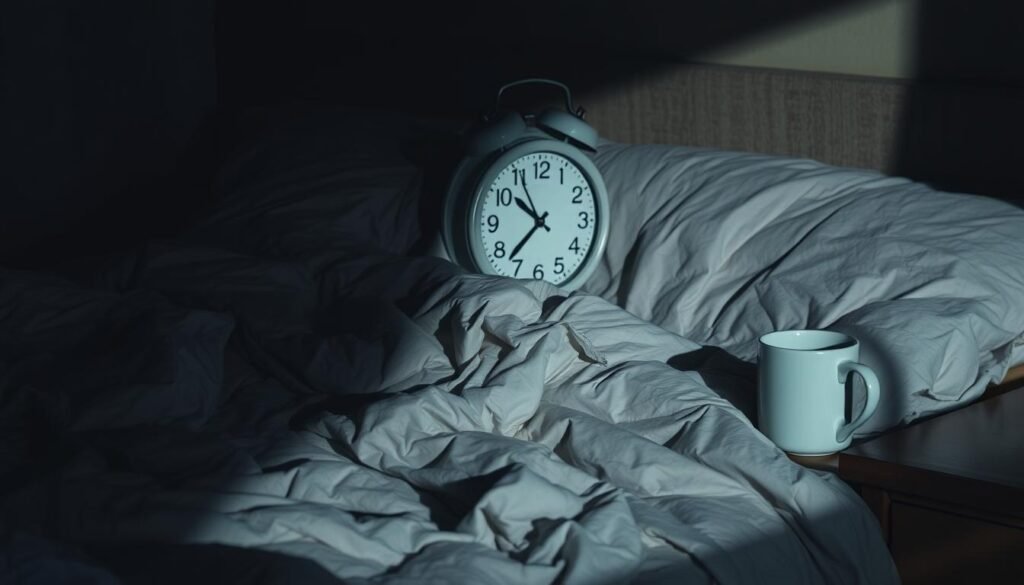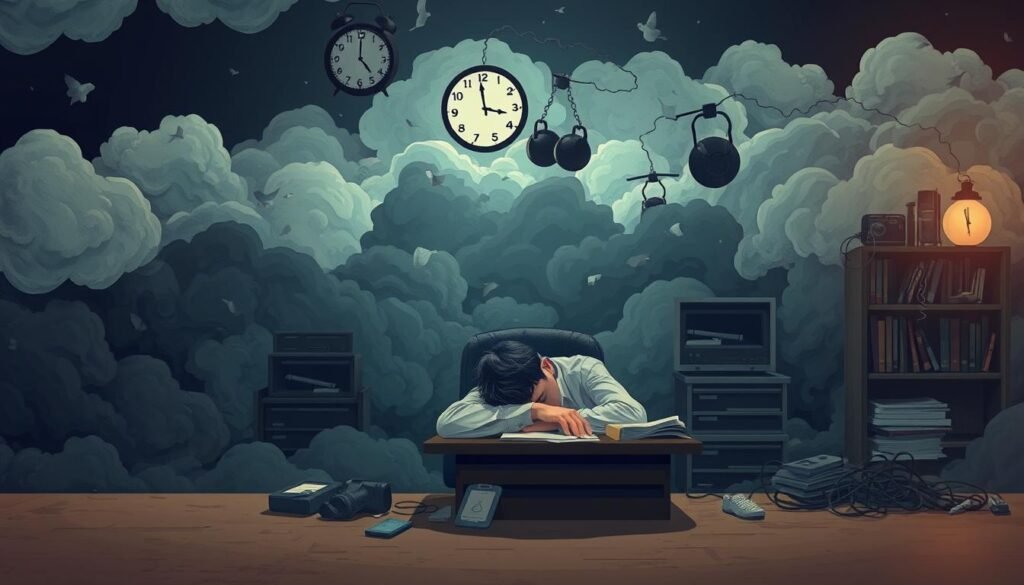Did you know nearly half the people feel wiped out after work? This fact shines a light on post-work exhaustion. It’s a big issue for lots of us. We get tired because of work stress, not sleeping well, and eating poorly. It’s important to find out why and fix it, so we feel better after a hard day’s work. People with stressful jobs often don’t sleep well, which makes them feel even more tired.
To learn more about this, check out this informative article. It talks about the different reasons we get tired from work and how to feel more awake.
Key Takeaways
- Post-work exhaustion affects about 50% of professionals.
- Stress and poor sleep significantly contribute to fatigue levels.
- Regular breaks during work hours enhance productivity and energy.
- Adequate hydration is essential for sustaining energy throughout the day.
- Implementing dietary changes can positively affect overall energy levels.
- Understanding physical and mental fatigue helps in addressing energy issues more effectively.
The Normality of Post-Work Tiredness
It’s normal to feel tired after work. Many people feel their energy drop after their workday ends. This is because both your mind and body have been working hard. Long hours and tough tasks can leave employees feeling wiped out by day’s end.
A study with 62 nurses showed something interesting about rest. It split them into two groups based on how well they slept: one with high sleep quality and another with low. The group that slept well felt less tired after long night shifts. This shows how crucial good sleep is in fighting off fatigue.
In Japan, many places work two shifts, including 16-hour nights. This causes a lot of tiredness. But taking short naps during these shifts can help. Naps fight sleep loss and help adjust your body clock, which is vital for dealing with tiredness at work.
Seeing post-work tiredness as a normal part of job stress helps. It means people can tackle their tiredness without feeling alone. By finding good ways to rest and recover, they can overcome exhaustion. This helps in becoming more productive and energetic.
Understanding Fatigue vs. Sleepiness
Fatigue and sleepiness are different in how they affect us. Fatigue means always feeling low energy, more than just being tired. It doesn’t go away with rest, making daily tasks hard. Sleepiness, on the other hand, is wanting to sleep when you’re not rested enough.
These conditions stem from various causes. They often come from using too much energy with work or thinking a lot, and not sleeping enough to recover. When you feel the symptoms of fatigue, it’s like your energy is stolen. It makes doing anything well really tough. Knowing if you’re mainly fatigued or just sleepy can help find the best way to feel better.
Here are the key differences between fatigue and sleepiness:
- Fatigue shows as lasting tiredness, a drop in wanting to do things, and trouble focusing.
- Sleepiness means really wanting to sleep, yawning a lot, and almost falling asleep without meaning to.
- Fixing fatigue might need changing your lifestyle or getting medical help. But if you’re just sleepy, a quick nap or a good sleep could be enough.
Why Am I So Tired After Work
Many people want to know why they feel so tired after work. It’s common to feel drained at the end of a workday. Different reasons could be making you feel this way.
Common Symptoms of Post-Work Fatigue
It’s important to recognize the signs of being worn out. You might feel:
- Daytime drowsiness
- Muscle aches
- Irritability
- Trouble concentrating
- Gastrointestinal issues
These signs suggest that work could be affecting your health.
Physical vs. Mental Exhaustion
Physical and mental tiredness are not the same. Physical tiredness comes from a lot of activity or hard work. Mental tiredness often happens because of stress or too much thinking.
Reasons for feeling tired after work can vary. They might include:
- Extended work hours
- Poor diet
- Sedentary job roles
- Interpersonal conflicts
- Poor management practices
Handling these issues can help tackle both physical and mental exhaustion. This could lead to better work settings and happier workers.
Impact of Lack of Sleep
Not getting enough sleep greatly affects our energy and tiredness. Working long hours makes this worse, leading to more exhaustion. Not sleeping enough can harm our body and mind. It can increase the risk of problems like obesity and heart disease. To improve, we should follow good sleep habits. This helps us avoid the bad effects of not sleeping enough, keeping us productive.
How Sleep Deprivation Affects Energy Levels
Getting less than 7 hours of sleep nightly changes how we work during the day. Research shows that people with tough jobs feel more tired if they don’t sleep enough. Thinking too much about work can also make us more tired. To feel better, we should relax more. Doing things like mindfulness and having a routine after work can reduce stress. This makes us feel more energized.
Strategies for Better Sleep Hygiene
Good sleep habits can really help improve how energetic and healthy we feel. Here are some steps to take:
- Maintaining a consistent sleep schedule.
- Creating a restful sleep environment.
- Avoiding screens before bedtime.
- Engaging in regular physical activity to help manage stress.
- Rewarding oneself after achieving daily tasks as a motivational tool.
If you’re still feeling very tired, it might be good to ask for expert advice. There are good resources available. They talk about extra treatments that can help, along with the usual ones. To learn more, go to alternative therapies for fatigue treatment.

Role of Poor Diet
A poor diet can make you feel tired and without energy. Eating right is key to keep your energy up during the day. When you change what you eat, you can feel better and be more alert.
How Nutrition Affects Energy Levels
What you eat affects how energetic you feel. Eating too much processed food and not enough nutrients can make you feel sluggish. Your body needs a mix of carbs, proteins, fats, vitamins, and minerals to work well.
Recommended Dietary Changes
By making some changes to your diet, you can feel more energized. Here’s what you can do:
- Incorporate whole grains like quinoa, brown rice, and oats for sustained energy release.
- Choose lean proteins such as chicken, fish, and beans, essential for muscle maintenance and energy production.
- Include a variety of fruits and vegetables to ensure adequate vitamin and mineral intake.
- Limit excessive sugar and caffeine consumption to avoid energy crashes later in the day.
- Stay hydrated by drinking plenty of water throughout the day, as dehydration can lead to decreased energy levels.
Effects of Stress and Mental Fatigue
Understanding stress effects at work shows how different factors cause mental fatigue. Stress from work can lead to a cycle of tiredness and less productivity. High-pressure jobs can cause chronic stress, shown through too much work and strict deadlines.
Many people feel anxious and have mood swings when they have too much to do without breaks.
Work Environment Stressors
It helps to know what causes work stress so you can deal with it. Key stressors are:
- Excessive job demands
- Lack of breaks and relaxation opportunities
- Poor communication and relationships with coworkers
- Job dissatisfaction and uncertainty about the future
Studies show that people in hard-thinking jobs have more insomnia than others. This tiredness can make work performance worse. Taking short breaks or trying the Pomodoro Technique can help.
Long-term Psychological Effects
Chronic stress can lead to anxiety, depression, and emotional struggles. Mental tiredness can make other problems worse, like less physical stamina and higher risk of drug problems. It can also affect your eating habits, making you eat too much or too little.
Being very tired all the time can make you miss mistakes, especially in jobs where details matter. This can be risky, especially in important jobs. Making friends at work and trying relaxation methods like yoga can help. Getting enough sleep, about 7 to 8 hours, is key for good health. For more info, click here.

The Consequences of a Sedentary Job
Sedentary jobs can lead to many health issues because of too little movement. Employees often feel inactivity exhaustion. This is feeling tired and sluggish from sitting too much. Muscle stiffness and poor blood flow can make this worse, affecting how energetic and well you feel.
A study with nurses showed that the issue is complex. Nurses who felt appreciated and in control were less tired. So, feeling motivated can help fight the downsides of sitting all day. Knowing that enjoying your job can make you feel better is important for those with sedentary work.
Not moving much can also tire your brain. Research shows that doing hard brain work without physical activity can harm your brain. This especially hurts the part of the brain that helps us think clearly. So, sitting too much can make it harder to think and affect how we get along with others.
To solve this, it’s key to move and take breaks often. Simple actions like walking shortly or stretching can fight inactivity exhaustion. Adding fun and active breaks can make work more enjoyable. This can help reduce the negative effects of sitting too much.
Here is a table summarizing some of the key consequences associated with a sedentary job:
| Consequences | Description |
|---|---|
| Physical Health Issues | Increased risk of obesity, cardiovascular diseases, and musculoskeletal disorders. |
| Mental Fatigue | Accumulation of mental exhaustion leading to reduced cognitive function. |
| Decreased Productivity | Reduced focus and energy levels impacting overall work performance. |
| Mood Disorders | Higher incidence of stress, anxiety, and depression among sedentary individuals. |
| Increased Errors | Fatigue can lead to mistakes, reducing job performance quality. |
Hydration and Its Importance
Staying hydrated is key to keeping our energy up and our bodies working well. Our bodies are mostly water, showing how vital hydration importance is for us. If you feel tired, have a dry mouth, or get confused, you might need more water to avoid serious health problems.
Signs of Dehydration
Not having enough water can really affect your health. You could feel:
- Thirsty
- Dry mouth
- Tired
- Dark-colored urine
- Dizzy or confused
Remember, feeling thirsty might mean you’re already a bit dehydrated. Check your urine to know for sure; if it’s clear and pale, you’re probably well-hydrated.
How to Stay Hydrated Throughout the Day
Here’s how much water you should drink:
| Gender | Recommended Fluid Intake (cups) |
|---|---|
| Women | 9 |
| Men | 13 |
To stay hydrated, try these tips:
- Drink water all day.
- Eat foods full of water.
- Carry a water bottle with you.
- Change how much you drink based on what you do.
If you work out, you need to drink more to replace what you lose in sweat. For every pound lost from sweating, drink a pint of water. Keep an eye on your hydration when exercising to avoid dangerous dehydration. If you get confused or your heart beats too fast, you might need urgent medical care. Check out this detailed guide for more about why water is so important.

Physical Exertion and Energy Drain
It’s important to know how physical exertion and energy levels after work are linked. Being active can boost your energy and mood because of endorphins. It’s key to find the right amount of exercise, as too much or too little affects your energy.
Balancing Work and Exercise
Work often takes time that could be used for exercise. It’s vital to find a good balance for your energy. Try short activities throughout the day. This could mean fast walks during breaks or taking stairs. These changes can keep energy up and cut down on fatigue post-work.
Some behaviors make after-work tiredness worse:
- Not resting enough between activities.
- Ignoring nutrition when you’re more active.
- Skipping rest days in workout plans.
A regular workout of 15 minutes a day can lift your energy and ease the tiredness from physical work. Recognizing fatigue signs, like trouble focusing or no motivation, helps adjust your routine. Talking to doctors can uncover health issues causing ongoing tiredness.
| Exercise Type | Physical Exertion Effects | Benefits |
|---|---|---|
| Cardio (e.g., running, cycling) | Increases heart rate, burns calories | Improves heart health, lifts mood |
| Strength Training | Builds muscle, increases strength | Better metabolism, more energy |
| Flexibility Exercises (e.g., yoga, stretching) | Improves flexibility, eases muscle tension | Lowers stress, helps relax |
Combining different exercises fights energy loss and supports a healthy lifestyle. This balance can change tiredness into energy, improving health and happiness.
The Impact of Work-Life Balance on Energy Levels
A good work-life balance boosts your energy and satisfaction at work. Not doing so can lead to stress, making you feel unfocused and tired. This is common in many jobs.
Facing work during personal time can lead to burnout. It makes you feel drained. Setting limits, like work hours, and making time for fun helps manage energy better.
There are ways to fight feeling tired after work. Exercise helps a lot, and eating right gives you the energy you need. Drinking water keeps you sharp, and taking breaks refreshes your mind. These steps improve how you feel and perform at work.
Some people stay up late to get “me time,” which makes them tired the next day. This can make work less satisfying. Rethinking after-work activities to include relaxation and being mindful is important.
| Factor | Impact on Energy Levels |
|---|---|
| Work-Life Imbalance | Increases chronic stress and fatigue |
| Exercise | Boosts energy and reduces stress |
| Hydration | Essential for maintaining energy |
| Sleep Hygiene | Critical for regulating overall energy |
| Personal Time | Enhances mental well-being and productivity |
In conclusion, a healthy work-life balance promotes better energy and job satisfaction. Taking time for yourself and reducing stress are key to feeling less tired after work. This improves your overall happiness.
Addressing Underlying Medical Conditions
Fatigue often tells us something might be wrong with our health. It’s crucial to pay attention to ongoing tiredness. Many medical issues can cause chronic fatigue. Finding out these chronic fatigue causes is key for getting better.
Common Medical Issues Leading to Fatigue
These medical issues can make you feel tired:
- Sleep apnea – A sleep disorder that leads to feeling very tired during the day.
- Anemia – A lack of enough red blood cells, often due to not having enough nutrients.
- Thyroid disorders – Problems like hypothyroidism that affect your energy and health.
- Postural Orthostatic Tachycardia Syndrome (POTS) – A disorder that affects up to three million Americans, especially women. It can make you feel very tired, dizzy, and foggy.
- Chronic Fatigue Syndrome (CFS) – A complex condition that makes you feel very low on energy.
Dealing with these health issues is critical to overcome medical conditions fatigue. Getting help early can make life much better.
When to Consult a Doctor
If you’re still tired after trying to improve your lifestyle, see a doctor. A health professional can find if a bigger health problem is causing your tiredness. Sometimes, fatigue is a clue to something like sleep issues or chronic diseases. Getting advice from a doctor is important to tackle these problems early.
Conclusion
A lot goes into feeling tired after work. Not enough sleep, eating poorly, too much stress, and not moving around contribute to this. Most adults need 7-9 hours of sleep to be their best. However, many have trouble sleeping well, which makes them tired during the day.
To fight this tiredness, focus on your health. Healthy food, drinking water, and exercise can help. It’s also important to manage stress to keep your energy up. Check out this resource to learn about important nutrients.
Making good choices in your daily life can help beat tiredness. Avoid too much coffee and alcohol. If you know why you’re tired, you can find ways to feel better. This helps you do well at work and in your personal life.